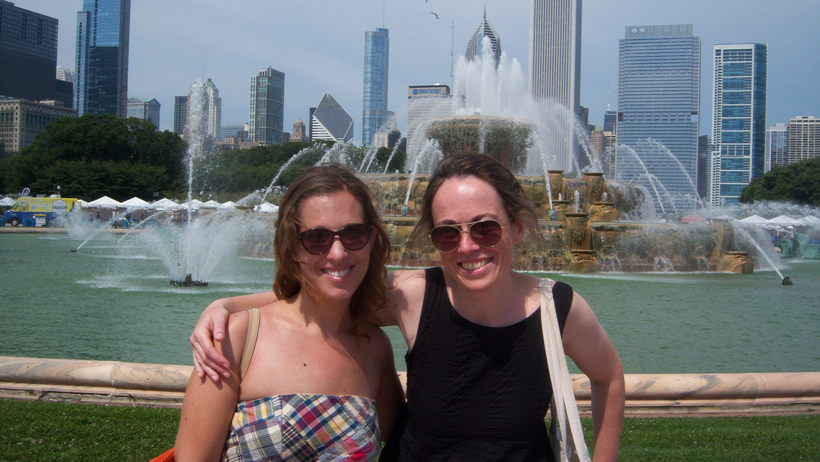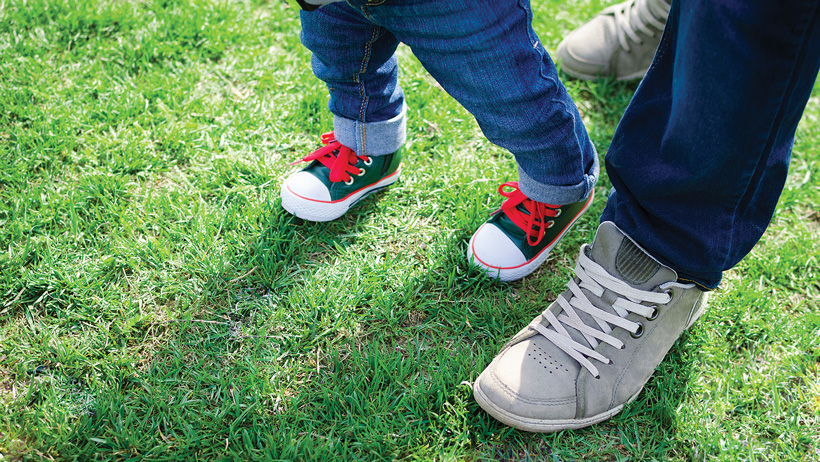The only period in my life when Shabbat felt completely different from the rest of the week was when I was away at summer camp. We'd take a break from our usual schedule for different activities, different meals and walks down to the outdoor chapel in the woods where we had to beware sitting in sap.
As a professor and a writer, I tend to work right through weekends. But as a professor, I also get a sabbatical in the seventh year at my job at a small college in Iowa. I spent mine in Chicago writing a book. I didn't need to be an English professor to notice the etymological root of sabbatical, but I didn't know that my sabbatical would also be a Sabbath of sorts, reconnecting me to a Jewish community as I took a rest and a true separation from my day-to-day life.
Separation might've been the most prominent thing I was looking for when I decided to spend a year in a new city. I left an intense job as well as the burdens of an old house and unruly yard for a studio apartment in Lakeview that I could thoroughly clean in a little over an hour -- the same length of time I now walked my dog each day (before that year's polar vortex set in, at least). I also lived without a TV for the first time in my life and found I didn't miss it a bit -- strange since, as a kid, going without such things on the weekend seemed to me probably the hardest thing about being observant.
Living in Chicago -- with actual, precious time -- was simultaneously restful and stimulating. I visited museums and bookstores; I went to film festivals and live lit performances and improv shows; I discovered new streets with my dog; I sat by the lake reading; I navigated the city by train, bus and foot; I met new people and other writers; I joined the Writers WorkSpace, a shared writing studio where we all faced the walls, silence the rule, but the isolation-with-isolated-company proved more productive than actually being alone with my laptop. The more new stimulation I found in the city, the more restful my sabbatical seemed.
The biblical origin of the Sabbath is, of course, a moratorium on creation. But the idea behind a professional sabbatical is that rest will lead to creation. (I had to propose a major project to be granted the time off in the first place, after all.) When you look up Sabbath-related definitions of creation and work, though, you find mentions of acts that exert "control" or "dominion" over your environment.
Muddling through the ups and down of writing a first novel, I definitely wasn't working in any such way. I'd been teaching a Caribbean literature course for years, but to write my own novel set in the Caribbean, I was immersing myself in research and my own imagination in a vastly different way, relinquishing my teacherly dominion.
Other tenets of Shabbat are less familiar to me as a person raised in a mixture of traditional and secular life: for example, the rule not to carry things into the public sphere. In some ways, during my sabbatical, I was removing myself from the public sphere, taking a break from the professional life I had in which the boundary between my public and private selves was almost nonexistent. I appreciated the close relationships I had with students and the things I could share with them beyond the confines of the classroom, but it was freeing to live somewhere where I could feel like a student myself, soaking in everything around me and learning, day by messy day, how to write my book.
Living in a Jewish community again also made me feel like I was in a different stage of my life -- a new one and an old one, both. And like many Jewish rituals, some of the best moments were food-related. Hearing the toast options at Eleven City Diner, I almost said to the waiter: "You had me at marble rye." Walking into the Jewel Osco on Southport, I stood speechless in front of the shelves of Passover food stretching so far in front of me. (Next to me, a woman on her phone: "They don't have much. I'm gonna have to go to Whole Foods." Everything's relative.)
I had holiday dinners with one of my oldest friends; we'd grown up together at the same synagogue, Sunday school, and the summer camp with the sappy chapel benches. I also spent holidays with new friends I met through meals with the YAD group at Anshe Emet Synagogue, where I discovered the cantor who officiated at my Cleveland bat mitzvah now presided. Services felt like the services of my childhood, and the cantor and his wife were kind enough to have me over to break the fast. Tashlich at the lake, chatter about where to get the best bagels in town: though Chicago was new to me, I felt as though I was returning to a way of life I hadn't had in a while. And I'd return to my regular life at the end of the year, refreshed.
Writing a book has always been my longest-standing dream, and while it took intense focus, the greatest gift my sabbatical gave me was a chance to unfocus, which turned out to be the only way I could refocus. My year living in Chicago was the closest I've come as an adult to those refocusing camp Shabbats, with their leisurely hours and their different feel -- and bagels never hurt.
Rebecca Entel is an English professor living in Iowa. Her new novel, "Fingerprints of Previous Owners," written while she was on sabbatical in Chicago, is now available from The Unnamed Press. She'll be doing a reading from the novel and discussion at 6:30 p.m. Thursday, June 22 at City Lit Books, 2523 N. Kedzie Blvd. (Get more info)








.jpg)



